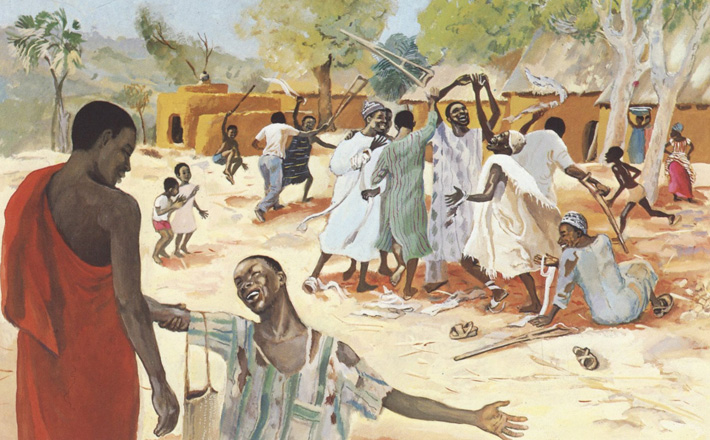Commentary on Psalm 111
Following an initial doxological summons to “praise the LORD” (hallu yah), the psalmist composed Psalm 111 in the acrostic form.
A successive letter of the Hebrew alphabet begins each bicola through verse 8, and each tricola in verses 9 and 10.1
In verse 1, the psalmist declares his intention to offer his wholehearted praise both privately, in the circle of intimate, upright friends (sôd), and publically in the gathered congregation (?e?â). There will be none who do not hear this psalmist’s glad testimony!
The poet is awed by the works (ma?aseh) of the LORD (verse 2a). References to the power of his works (ma?asayw) and the works of his hands (ma?asê yadayw) appear in verses 6 and 7, respectively. Beyond these, synonyms for the LORD’s works appear in verses 3 (“his works,” pa?alô) and 4 (“his wonderful deeds,” nipla?ôt). The LORD’s works are to be studied diligently and made the center of one’s delight for their own sake, but also because they are revelatory of the character of God. God’s acts demonstrate the LORD’s enduring righteousness (verse 2) even as his wonderful deeds disclose the divine disposition to be gracious and merciful.
The psalmist has in mind very specific works of the LORD that he rehearses in verses 4 to 9. Tones of the song and story of Exodus echo throughout the poem. Verse 4 summons to mind Exodus 34:6. Verse 5 recalls the miraculous feeding in the wilderness recorded in Exodus 16 while verse 6 evokes the entire conquest tradition in the phrase “the heritage of the nations.” The latter point is confirmed by Jeremiah 3:19 where the phrase appears in association with the land:
I thought
how I would set you among my children,
and give you a pleasant land,
the most beautiful heritage of all the nations.
And I thought you would call me, My Father,
and would not turn from following me.
Verses 5 and 9 recall the covenant about which the LORD is “ever mindful” (verse 5) and which is “commanded forever” (verse 9).2
Verse 9 also refers to LORD’s “redemption” which was sent to his people. The word translated as “redemption,” pedû?, is constructed from a verb that conveys the idea of ransom. Forms of the noun appear in Isaiah 50:2 and Exodus 8:19, both times in the context of Israel’s redemption from exile.
In sum, the psalmist intends to evoke memories of the LORD’s deliverance in Israel’s past, as well as the covenant tradition, especially when it was renewed in Exodus 34. These are the works of the LORD that move him. But his praise does not revolve around a distant memory.
By studying the works of the LORD, by delighting in them, by recalling the covenant the LORD established with “his people” in the past (verses 6, 9), the redemptive events of Israel’s past become present for the God’s people now. The psalmist, his circle of friends, and the worshipping congregation (verse 1) participate in the salvific acts of God through praise and worship. Indeed, the emphasis on the permanence of the LORD’s works rings like a bell throughout the poem:
- The works of the LORD, like his righteousness “endures forever” (verse 3).
- The LORD is “ever mindful” of his covenant (verse 5).
- The LORD’s works are established “forever and ever” (verse 8).
- The LORD has commanded his covenant “forever” (verse 9).
Consequently, the LORD’s praise “endures forever” (verse 10), evoking awe — and the wisdom and understanding that come with it — for the present congregation.
This intersection of past and present in the psalmist’s experience and in the context of praise and worship provides a point of contact between this psalm and the Christian worshipping community. If the psalmist could recall the character of God in the recollection of God’s works, Christians have more cause to utter these words of praise.
Christians have seen the power of God’s work in the weakness of the cross. Christians have seen God’s faithfulness in the work of Christ’s wounded hands. Christians, like the prophet, Anna the daughter of Phanuel, have seen the “redemption of Israel” (Luke 2:38). Christians can affirm that the redemption sent to Israel redeemed once and for all with his blood (Hebrews 9:12). Christians praise God for God’s works not because of what God has done in the past, but because the work of God, the righteousness of God, the love of God approaches us again and again in the cup and the loaf. Hallelujah!
1 On acrostic poetry, see the entry for Pentecost 20 2013 of WorkingPreacher.org and the remarks on Psalm 37 found there.
2 Leslie C. Allen discerns five vocabulary links in this Psalm to Exodus 34:10, and additional single links with Exodus 34:5 and 34:11. See Leslie C. Allen, Psalms 101-150, vol. 21 in Word Biblical Commentary (Waco, TX: Word Books, 1983), 90.


October 13, 2013